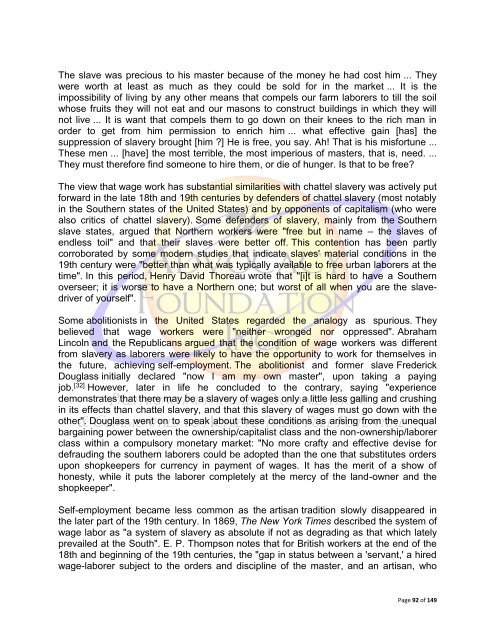Hidden Unemployment
Hidden Unemployment
Hidden Unemployment
Create successful ePaper yourself
Turn your PDF publications into a flip-book with our unique Google optimized e-Paper software.
The slave was precious to his master because of the money he had cost him ... They<br />
were worth at least as much as they could be sold for in the market ... It is the<br />
impossibility of living by any other means that compels our farm laborers to till the soil<br />
whose fruits they will not eat and our masons to construct buildings in which they will<br />
not live ... It is want that compels them to go down on their knees to the rich man in<br />
order to get from him permission to enrich him ... what effective gain [has] the<br />
suppression of slavery brought [him ?] He is free, you say. Ah! That is his misfortune ...<br />
These men ... [have] the most terrible, the most imperious of masters, that is, need. ...<br />
They must therefore find someone to hire them, or die of hunger. Is that to be free?<br />
The view that wage work has substantial similarities with chattel slavery was actively put<br />
forward in the late 18th and 19th centuries by defenders of chattel slavery (most notably<br />
in the Southern states of the United States) and by opponents of capitalism (who were<br />
also critics of chattel slavery). Some defenders of slavery, mainly from the Southern<br />
slave states, argued that Northern workers were "free but in name – the slaves of<br />
endless toil" and that their slaves were better off. This contention has been partly<br />
corroborated by some modern studies that indicate slaves' material conditions in the<br />
19th century were "better than what was typically available to free urban laborers at the<br />
time". In this period, Henry David Thoreau wrote that "[i]t is hard to have a Southern<br />
overseer; it is worse to have a Northern one; but worst of all when you are the slavedriver<br />
of yourself".<br />
Some abolitionists in the United States regarded the analogy as spurious. They<br />
believed that wage workers were "neither wronged nor oppressed". Abraham<br />
Lincoln and the Republicans argued that the condition of wage workers was different<br />
from slavery as laborers were likely to have the opportunity to work for themselves in<br />
the future, achieving self-employment. The abolitionist and former slave Frederick<br />
Douglass initially declared "now I am my own master", upon taking a paying<br />
job. [32] However, later in life he concluded to the contrary, saying "experience<br />
demonstrates that there may be a slavery of wages only a little less galling and crushing<br />
in its effects than chattel slavery, and that this slavery of wages must go down with the<br />
other". Douglass went on to speak about these conditions as arising from the unequal<br />
bargaining power between the ownership/capitalist class and the non-ownership/laborer<br />
class within a compulsory monetary market: "No more crafty and effective devise for<br />
defrauding the southern laborers could be adopted than the one that substitutes orders<br />
upon shopkeepers for currency in payment of wages. It has the merit of a show of<br />
honesty, while it puts the laborer completely at the mercy of the land-owner and the<br />
shopkeeper".<br />
Self-employment became less common as the artisan tradition slowly disappeared in<br />
the later part of the 19th century. In 1869, The New York Times described the system of<br />
wage labor as "a system of slavery as absolute if not as degrading as that which lately<br />
prevailed at the South". E. P. Thompson notes that for British workers at the end of the<br />
18th and beginning of the 19th centuries, the "gap in status between a 'servant,' a hired<br />
wage-laborer subject to the orders and discipline of the master, and an artisan, who<br />
Page 92 of 149

















